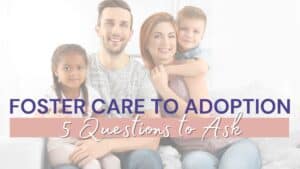
Foster Care to Adoption: 5 Questions to Consider
If you’re hoping to adopt a child, becoming a foster parent is often a great way to bring into your home a child who may,

Four compelling reasons to tell your children the story of their adoption
Experts cite four compelling reasons why children need to know their adoption story.
When children join their families through adoption and do not hear their story, they sometimes fill the vacuum with fantasy. Jonathan, age 10, imagined that his birthmother lived in a beautiful home near the ocean and when he was older, he would visit her. The problem? Jonathan’s mother was in prison and would be for a long time. Jonathan walked on the quicksand created by fantasy instead of truth.
Whether children enter adoptive homes as infants or older children, they bring a past with them. Having little or no information about the people in the past and the circumstances that led to adoption can leave those who are adopted with deep and pervasive feelings of being disconnected. A child’s story is the bridge that connects the past to the present and beyond.
One of the most important issues for those who are adopted is trust. A major task for adoptive parents is to create an environment where adoption can be discussed freely, openly, and honestly.
A longtime expert in the field of adoption, Dr. Randolph Severson, commented that when adopted persons find out the secret(s), they state that they have suspected it, but have never admitted that. Severson explains, “There were probably subtle hints along the way, such as lack of pictures during pregnancy or coming home from the hospital. There were probably no stories unless they were fabricated. Some have resurrected memories of whispers at family gatherings. As the truth emerges, there is a rhythm of shock, anger and relief.”Jayne E. Schooler and Betsie L. Norris, Journeys After Adoption, (Westport, CT: Begin and Garvey Publishers, 2002), 51.
When adopted children grow up in an environment where no one talks of the past or mentions their birth family, they receive a message: Do not ask. Dr. Severson illustrates the subtlety of this message. “Think back to growing up. Did you have a pet that died? Did you have a pet that disappeared? Which one was more difficult to get over? The pet that died or the one that disappeared? The answer is the pet that disappeared. With death comes closure. With disappearance, one is sentenced to a lifetime of wondering.”Ibid.
For adopted children, having no ability to know what happened to the significant people in their lives sentences them to a lifetime of wondering. One adopted teen commented, “I know I have a birth family out there somewhere. Some days I actually look into crowds hoping maybe to see someone that looks like me.”